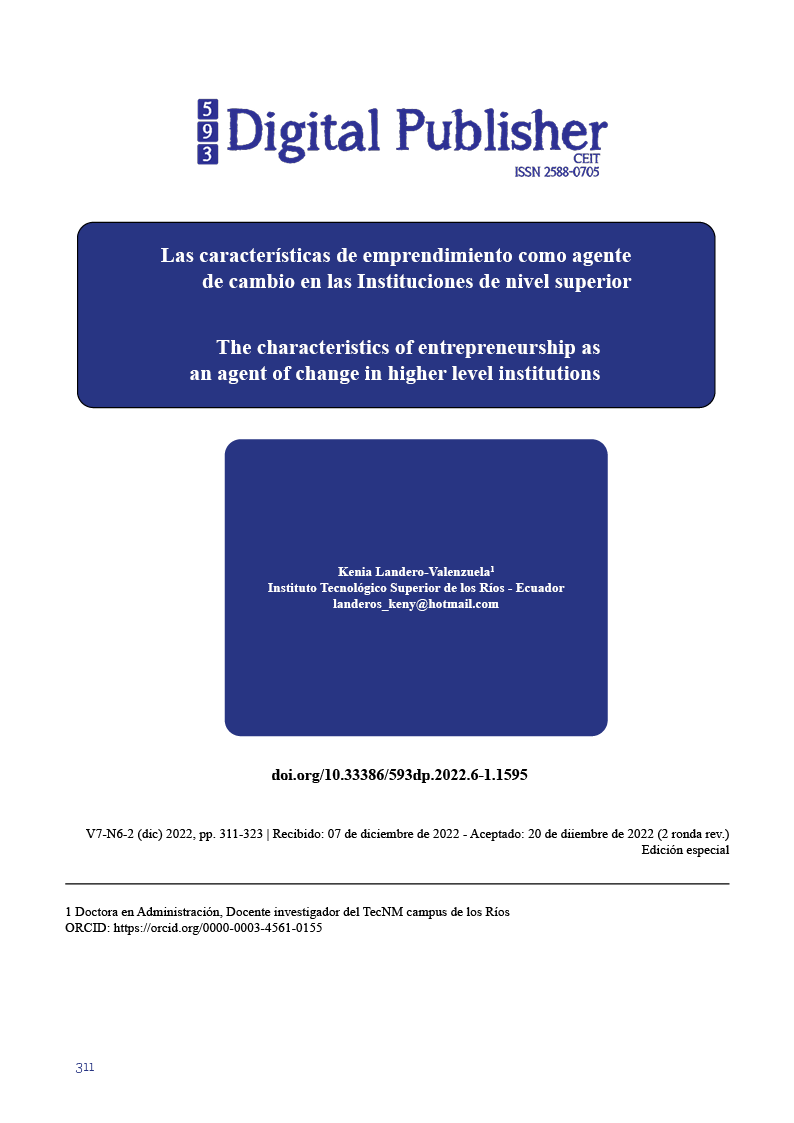The characteristics of entrepreneurship as an agent of change in higher level institutions Resumen
Main Article Content
Abstract
Many of the definitions of entrepreneurship are accompanied by various qualities and capacities of a person to make the most of resources and make them more efficient; That is why entrepreneurship carries with it a series of basic characteristics. According to John Kao (1989), the entrepreneur is a person with very particular characteristics. The purpose of this research is to analyze the entrepreneurial capacity of the students of the Tecnológico Nacional de México campus de los Ríos through five basic characteristics, among them: creativity, self-confidence and their abilities, perseverance, ability to handle problems and acceptance. to the risk proposed by Alcaraz (2011); this with the purpose of detecting areas of opportunity in the students of said institution and that allows establishing efficient strategies for the training of professionals capable of undertaking at any level, in turn analyzing entrepreneurship as an agent of change in institutions not only from From the business perspective, the development of the research is carried out under the quantitative methodology, with a descriptive approach and transversal design, using as an instrument a questionnaire with 25 items analyzing the entrepreneurial characteristics mentioned above.
Key words: entrepreneurship, education, skills, change.
Downloads
Article Details

This work is licensed under a Creative Commons Attribution-NonCommercial-ShareAlike 4.0 International License.
1. Derechos de autor
Las obras que se publican en 593 Digital Publisher CEIT están sujetas a los siguientes términos:
1.1. 593 Digital Publisher CEIT, conserva los derechos patrimoniales (copyright) de las obras publicadas, favorece y permite la reutilización de las mismas bajo la licencia Licencia Creative Commons 4.0 de Reconocimiento-NoComercial-CompartirIgual 4.0, por lo cual se pueden copiar, usar, difundir, transmitir y exponer públicamente, siempre que:
1.1.a. Se cite la autoría y fuente original de su publicación (revista, editorial, URL).
1.1.b. No se usen para fines comerciales u onerosos.
1.1.c. Se mencione la existencia y especificaciones de esta licencia de uso.
References
Alcaraz, R. ((2011). El emprendedor de éxito. 4th edición. México, editorial McGraw-. Hill/Interamericana Editores, S.A. de C.V.
Acs, Z. J., Desai, S., & Hessels J. (2008). Entrepreneurship, economic development and institutions. Small Business Economics, 31, 219‐234.
Calvo, C. (2004). Emprendedores Expansión. Recuperado de: http://www.tress.com.mx/boletín/diciembre2004/articulo4.htm.Estrada, E. R. R. (2016).
Censo de Población y Vivienda (2020). Panorama sociodemográfico de Tabasco: Censo de Población y Vivienda 2020 : CPV / Instituto Nacional de Estadística y Geografía. México INEGI, 2021.
Connelly, B. L., Ireland, R. D., Reutzel, C. R., & Coombs, J. E. (2010). The power and effects of entrepreneurship research. Entrepreneurship: Theory and Practice, 34, 1, 131‐149.
Gartner, W. (1985). A conceptual framework for describing the phenomena of venture creation. Academy of Management Review, 10 (4), 696-706.
Gartner, W. (1988). Who is an entrepreneur is the wrong question. American Small Business, 13, 11-31.
Gibb, A. & Ritchie, J. (1981a). The Shell Entrepreneurs: Part.1, Entrepreuralism as a Social Process; Part.2, Understanding the star up process; Part.3, The Shell Competition and its impact. Durham: Durham University Business School.
Gibb, A. & Ritchie, J. (1981b). Influences on entrepreneurship: Study over time. U.K., Small Business Research Conferenc. London.
Hernández, R., Fernández, C., & Baptista, P. (2014). Metodología de la investigación 6ta. Edición. México D.F. editorial McGraw-Hill.
Ishida, M., Kantis H., Komori, M. (March, 2002). Entrepreneurships in emerging economies: The Creation and Development of New Firms in Latin America and East Asia. Inter-American Development Bank. pp. 1-131INEC. (2012).
Instituto Técnologico Superior de los Ríos (2022). Matrícula otorgada por el departamento de servicios escolares.
Landero, K. (2011). Diagnostico de los recursos y capacidades del Instituto Tecnológico Superior de los Ríos para transferir un modelo de incubación de empresas [Tesis de maestría, Universidad Autónoma de Tabasco].
Lerner, J. (2010). The future of public efforts to boost entrepreneurship and venture capital. Small Business Economics, 35, 255‐264.
Meyer, G. D. (2011). The reinvention of academic entrepreneurship. Journal of Small Business Management, 49, 1, 1‐8.
Muñozcano, J. (2006). ¿Tienes una idea?: El valor de las ideas: ¿cómo sé si soy emprendedor? Emprendedores. Recuperado de: http://www.esmas.com/emprendedores/ideasenpapel/eresemprendedor/493297.html.
Stokes, D., Wilson, N., & Mador, M. (2010). Entrepreneurship. Hampshire, UK: Cengage Learning EMEA.
Villaseñor (1988) De los Emprendedores Su Universo de Acción


